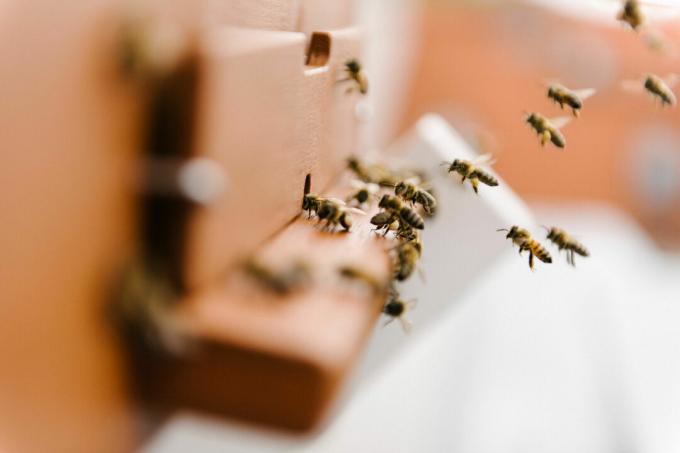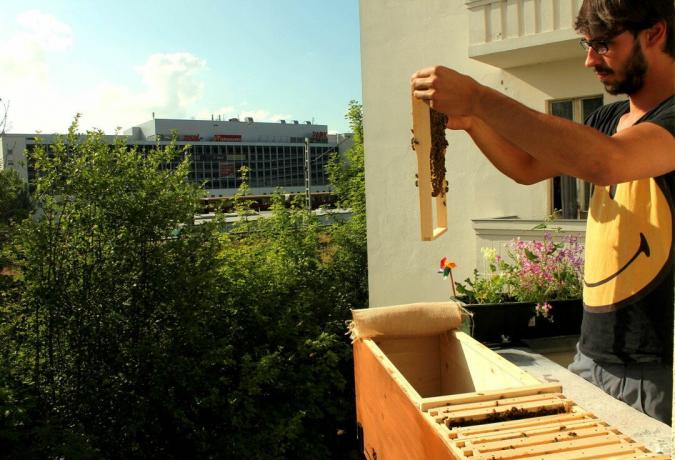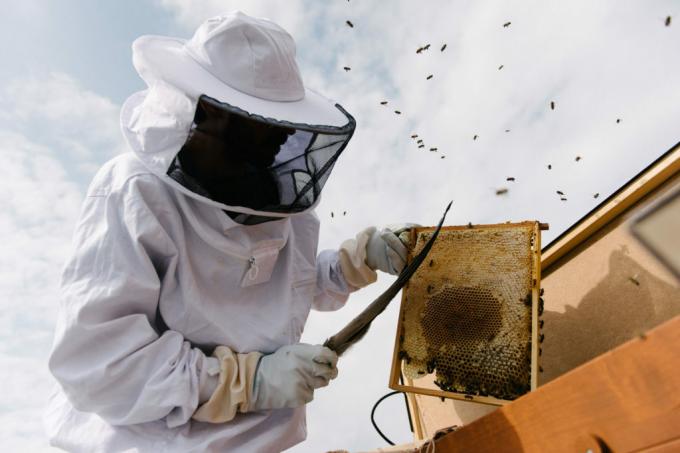Keep bees in town? This works out! What you have to pay attention to and what the city bees e. V. do anything else, tell us exclusively in this interview.

More ecological beekeeping in our cities: That is the approach of Stadtbienen e. V. We spoke to the founder Johannes Weber, who is also the inventor of the Bees box is. In an interview, he explains the reasons for bee deaths and how his association tries to counteract it. He also gives tips on how to become a city beekeeper yourself or how to get involved with the bees as a hobby gardener.
Hardly any other topic in the field of the environment received as much attention this year as the death of bees. What are the main triggers for this sad phenomenon?
There are two main factors: one is pesticide exposure from agriculture and the other is extreme monoculture. To explain what this has to do with bees, I have to go back a bit: a colony of bees has an inner flight radius of around three kilometers. In this room the bee colony collects everything they need for life, i.e. pollen, nectar and water. If one imagines that this colony of bees is standing in a rapeseed field that is laid out in a monoculture over a very large area, then this results in massive problems for the bees. When the rapeseed blossoms, there is enough to eat for the bees - but unfortunately not before or after. This then forces the beekeepers to have to find a new, suitable place for their colony, otherwise the bees would have too little to eat.
Then where is there room left for the bees?
These are mostly areas that are not used agriculturally, for example nature reserves or old railway areas or fallow land. There pesticides and monocultures do not burden the bee colonies.
Are there any other factors that make it difficult for bees?
Especially with the honey bees there is that Varroa mite added. This is a parasite that is not actually native here, but was introduced to Germany from Southeast Asia in the 1960s. Unfortunately, this parasite has become omnipresent. The varroa mites are extremely dangerous for honey bees and therefore most of them are dependent on the care of beekeepers. Most honey bees cannot defend themselves against the mite on their own. Without the active control of the varroa mite by beekeepers, a large number of honey bee colonies would die.

That sounds pretty sobering and doesn't exactly paint a happy picture for the bees. Before we turn to the questions of what you can do yourself to help bees, briefly something about you and your association: How did you come up with the topic of bees in the first place?
My grandfather already had bees - I seem to have noticed that from him. When I moved to Berlin 10 years ago, I started keeping bees in the city. We had a garden with us in the tenants' community and it was through this garden that the bee topic came up. And that's how I really got into the subject.
What does urban beekeeping mean to you?
For me, the excitement lies in the fact that bees are a kind of image of nature in which one lives. And I believe that if you have a bee colony yourself, you have an intensive experience of nature that also triggers certain considerations about our environment. It is a fascination that arouses such enthusiasm once you have started and entered this learning process to see how a colony of bees reacts to certain things. Over time you enter into a relationship with this colony of bees: that is the experience of nature. I think that actually describes it pretty well. This enthusiasm that is aroused lasts and I haven't lost it so far. It has not become weaker either, but rather even stronger.
What exactly are you doing at Stadtbienen e. V.?
We are working to promote ecological beekeeping, or wild bee protection, in the city. We do that with specific offers. For example, we give beekeeping courses to show people how to keep bees sustainably in the city. This course lasts one year and consists of eight dates. In addition to the courses, we have developed the BienenBox. This is a special dwelling that we have adapted precisely to the needs of bees and people, with the aim of being able to keep bees in an ecological way in urban areas. We have been an association since 2014 and are on site with our courses in over 30 cities throughout the German-speaking region.

What do you think are the advantages of beekeeping in the city?
One advantage is, of course, that due to the high diversity in the city and the lower use of pesticides, a honey bee colony can be kept here with very simple means.
In addition, there is no problem of having to move the bees from A to B due to the insufficient diversity. Something is blooming everywhere and all the time in the city and there are no monocultures like those in the country. The whole pesticide story is also much less of a problem in the city, as there are no farmers here who roll out their pesticides during the day. There are many more beekeepers in a smaller space, so you often meet people who share the same hobby and can exchange ideas and maybe make new friends. A final advantage is that due to the large number of flowers in the city, the honey harvest is often better than in the country.
A little hint: At Plantura, bees are also very important to us. That's why we have ours Plantura bee pasture developed a seed mixture of over 20 annual and perennial proven species that provide bees, bumblebees and the like with plenty of food. You can also simply sow the mixture in a pot or balcony box on the balcony.
What would you call the downsides?
A lack of space is often an urban problem. If you don't have a garden, access to the roof or a balcony, there aren't many options left. In addition to the lack of space, the high density of bees in the city is a disadvantage. In Berlin there are around 10 bee colonies per square kilometer, which means that the likelihood that one colony will rob another is much higher. The neighbors can of course also be a big problem. So far we have had very good experiences with it. Nevertheless, one still has to contend with prejudice against bees.

In addition to the neighbors, who could be a problem, there may also be trouble with the landlord. Is there anything to consider?
We definitely recommend informing the landlord in advance. Regardless of whether you want to keep beekeeping on the roof or on the balcony. But I also believe that there is generally more and more openness to giving bees a home in the city. We are now also working with housing associations that put bee colonies on their roofs. In general, however, it is important to make arrangements beforehand so that there are no unnecessary conflicts.
Assuming you have the landlord's consent and want to get started right now: Which 5 first steps would you recommend?
Step one is to do some research beforehand. Nothing works without that. In the second step, you should then register for a beekeeping course. There you not only learn the theory, but are also shown a lot of practical things. Next you have to buy a container like the BienenBox and other equipment like a veil, smoker or stone chisel. Then you have to get the bee colony and, in the last step, register it with the veterinary office. This is mandatory in Germany. But then you can get started.

How expensive is it Hobby beekeeping in the city?
If you really get in now and start from scratch, you should expect around € 800.
What will it cost in the following years?
In the following years it is around € 50 per year.
And how much yield can I expect?
It's hard to say with a BienenBox, it can vary a lot from year to year. In one year it might be 2 kilograms of honey, in another year it is 10 kilograms. On average, I would assume that you can expect around 6 kilograms per year.
What is the difference between honey bees and wild bees?
The difference is pretty fundamental. Honey bees live as a colony, so they are a whole organism. In winter, for example, a colony is an amalgamation of 15,000 bees that form a complete colony Survive winter and feed on the honey you gathered in summer during the cold season to have. Honey bee colonies are therefore looked after by humans and have for a long time done their work purely in the agricultural sector. In the meantime, however, the topic of how honey bees can be kept in an ecological way, so that you meet them on an equal footing and not only exploit them, is coming up more and more.
In contrast to honey bees, most wild bees do not live together as one organism. They are usually solitary bees. There are over 560 wild bee species in Germany, but many species are already on the red list of animals threatened with extinction. Many wild bees are highly specialized in one type of plant or flower. This means that they live in a very close interaction: without these bees, the specific plant does not exist and without this plant the bee does not exist. This is called a lock and key principle. As long as the wild bees are not exposed to monoculture or pesticide pollution, they have a very good breeding ground to survive on themselves.

Doesn't beekeeping harm the wild bees?
Both types need to be protected, both need to be promoted. For us, the big question in the end is how can coexistence between wild and honey bees work? It is also not yet clear whether there is any competitive behavior between the two types, which is a disadvantage for either of them. The relevant question is whether there is enough food. And there is definitely enough food in the city. We can see that, among other things, in the fact that the honey harvest is larger in the city than in the country. That's why I don't see a problem at the moment.
Even if not everyone becomes a hobby beekeeper right away: What can a hobby gardener do to support the bees?
The most important thing is to let the garden run wild. In every corner where I do nothing, there is a high probability that I will do a lot of good. The next tip is to sow specific plants. I can combine that well with what I need in the kitchen. If I chives then I let the chives bloom. lavender is extremely attractive to bees, as well rosemary. There are many plants that I can use for myself and at the same time support the bees. Another tip is to watch out for flowers that are not double and the use of perennials Perennials or plantings. These provide nourishment for the bees in the long term too.
If you want to find out more about the topic, take a look at the City bees past.
